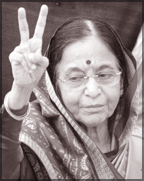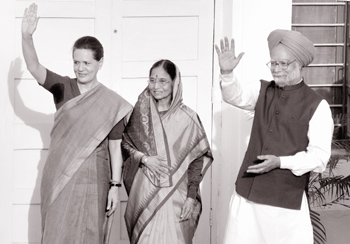A landmark in Indian politics
POLITICS: Pratibha Patil, who has been elected India’s first
woman president, was by no means a unanimous choice for the role.
Long associated with India’s Gandhi dynasty, Mrs Patil was a
low-profile governor of the state of Rajasthan before emerging as the
favoured presidential candidate of Sonia Gandhi, leader of India’s
Congress Party.
Her candidacy failed to temper a bitter disagreement over the
presidency between Congress, which leads a coalition Government, and
opposition parties.
|

Newly Elected Indian President Pratibha Patil shows a victory sign
at her residence after the announcement of poll results in New
Delhi, on saturday. AFP
|
Although opposing parties traditionally agree to a consensus
presidential candidate, Mrs Patil did face an electoral opponent -
sitting Vice-President Bhairon Singh Shekhawat, of the Bharatiya Janata
Party.
Correspondents say she will need a deft touch to straddle the often
bitter divides of Indian party politics. Born in 1934 in India’s western
state of Maharashtra, Mrs Patil has had a long and largely low-key
political career.
A lawyer by training, she joined Congress in the early 1960s before
spending some two decades in Maharashtra’s state legislature.
Next she moved into national politics, sitting in both the lower and
upper chambers of India’s national parliament before leaving the
political stage in the late 1990s.
Her appointment as governor of Rajasthan in 2004 saw her become the
first woman governor in the north-western state.
But decades of apparently unswerving loyalty to Congress - and, more
specifically, to the Gandhis - assured Mrs Patil of a hostile reception
from some quarters on her return to the national stage.

She came in for heavy criticism from opposition figures and in the
Indian media after emerging as a candidate for president.
Some criticised Mrs Patil’s character; others highlighted her time
away from high-level politics.
The BJP attempted to portray her as unsuitable for the post of
president, revealing that police were investigating both her husband and
her brother in connection with the (unrelated) deaths of a teacher and a
party worker.
Media reports focused on some of her public statements, including a
1975 suggestion that people with hereditary diseases should be
sterilised.
But the reports were dismissed as ‚Äúmud-slinging‚ÄĚ, and as the vote
approached Mrs Patil stridently rejected the criticism, insisting all
accusations against her were politically-motivated.
Instead her supporters suggested Mrs Patil’s election would prove to
be a landmark for women in a country where millions routinely face
violence, discrimination and poverty.
Patil was a table tennis champion who studied law before taking to
politics to build a career that is set to catapult her into Rashtrapati
Bhavan as India’s first woman president. She was an athletic teenager
when India became independent.
She studied both in Jalgaon and Mumbai to earn post-graduate degrees
in arts and law, and practised as an advocate in Jalgaon. She was a
champion in table tennis during college days, winning shields in
inter-college tournaments.
Social work drew her to politics, and the Congress was the first
choice in a state where the party held sway. She was elected to the
Maharashtra assembly in 1962 for the first time. A Rajput, she married
Devisingh Ransingh Shekhawat, a Maratha of Rajasthani origin, three
years later.
From 1972 to 1978, the soft-spoken Pratibha Patil was cabinet
minister in Maharashtra four times holding such portfolios as social
welfare, public health, prohibition, rehabilitation and cultural
affairs, and education.
When the Congress got dethroned in Maharashtra in 1979, she became
the opposition leader in the assembly and came to be seen as staunch
loyalist of the Gandhi family.
Pratibha Patil returned as cabinet minister in 1982, heading the
urban development and housing ministry, and also held charge of civil
supplies and social welfare.
She was elected to the Rajya Sabha, parliament’s upper house, in
1985, after nearly a quarter century of state politics.
She became deputy chairperson of the Rajya Sabha from 1986 for two
years. She was elected to the Lok Sabha in 1991 in a general election
marred by the assassination of former prime minister Rajiv Gandhi.
One of her most noteworthy actions as governor was her refusal to
sign the controversial Rajasthan Freedom of Religion Bill that banned
religious conversions. She argued that it contained provisions that
directly or indirectly affected fundamental rights related to religious
freedom.
Her husband Devisingh’s family had migrated to Amravati in Vidarbha
region more than a century ago. They have a son and a daughter. Pratibha
Patil headed the Maharashtra Pradesh Congress Committee (PCC) from
1989-90.
Pratibha Patil has been involved in the cooperative movement in
Maharashtra.
She also set up an industrial training school for the blind besides
starting sewing classes for poor and needy women.
She set up hostels for working women in New Delhi and Mumbai, an
engineering college for rural youths in Jalgaon, a sugar factory also in
Jalgaon and also a cooperative bank for women in Jalgaon.
A widely travelled person, she has been part of various Indian
delegations that went abroad. She attended the International Council of
Social Welfare Conference in Nairobi and Puerto Rico and led a
delegation to Austria on status of women.
She was a member of a Congress delegation to Bulgaria in 1985 and
attended the Commonwealth Presiding Officers Conference in London in
1988. She has also travelled to China to attend the World Women’s
Conference.
(BBC/Hindustan Times)
Looking ahead
Everyone knew it was a one horse race. There is nothing wrong in
guaranteed losers going all out to make a foregone conclusion look like
a real contest.
There is also nothing particularly wrong in exploiting weaknesses in
the opposing camp, seeing that due diligence does not seem to have been
done before nominating a person who was guaranteed, by the arithmetic of
the electoral college, to be India’s 12th President. (The 2007
presidential election was actually the 13th in the series that began in
1952, but Dr. Rajendra Prasad was elected twice, making him the only
President who was allowed two terms.)
But what was terribly wrong was for the Bharatiya Janata Party and
the National Democratic Alliance to resort to a smear campaign of
unprecedented viciousness, combining a modicum of fact with a maximum of
falsehoods and dirty tricks; and for sections of the news media to
participate in this intensely partisan propaganda.
Now that Pratibha Patil has been elected President of India with a
higher margin of victory than was predicted from the party alignments -
she won 2931 votes to her rival Bhairon Singh Shekhawat’s 1449 in the
electoral college, which meant that the winning difference was a massive
306,810 in vote value - the extreme bitterness that characterised the
campaign should be left behind.
The issue is no longer whether Ms. Patil is the right person for the
Rashtrapati Bhavan. It is how she should conduct herself institutionally
as the next President of the Republic.
Since these days all kinds of things are expected and indeed demanded
from the President, it is necessary to be absolutely clear about his -
and now, for the first time in India, her - role and functions in the
constitutional scheme.
The office is high on ceremony and symbolism but strictly
circumscribed in powers and functions - placing her or him on a par with
the British sovereign, more or less.
In the Indian context, the head of state may be politically elected
but the restraints imposed by the constitutional office are the same.
Walter Bagehot’s classic exposition of the role in The English
Constitution, which is as relevant today as it was in 1867, is that “the
Sovereign has, under a constitutional monarchy such as ours, three
rights - the right to be consulted, the right to encourage, the right to
warn. And a king of great sense and sagacity would want no others. He
would find that his having no others would enable him to use these with
singular effect.‚ÄĚ
What is more, the strictly circumscribed constitutional role requires
that the right to advise and the right to warn must be exercised
strictly in private and in confidence - and not through public
statements. This restraint required by the head of state is not a mere
constitutional formality but is based on sound democratic principles.
In the first place, in a parliamentary democracy, a non-executive
head of state must not, through statements critical of the
representative government, which has a greater democratic legitimacy,
place herself or himself in conflict with it.
Secondly, the head of state must at all times appear non-partisan and
remain above the fray when controversial and divisive questions are
being debated in the political sphere; and must avoid any public
statement that could give comfort to one side or the other.
But we need not rely only on Bagehot. “Under a parliamentary system
of government,‚ÄĚ India‚Äôs outstanding constitutional thinker, Dr. B. R.
Ambedkar, explained to the Constituent Assembly on December 30, 1948,
“there are only two prerogatives which the King or the Head of the State
may exercise.
One is the appointment of the Prime Minister and the other is the
dissolution of Parliament. With regard to the Prime Minister, it is not
possible to avoid vesting the discretion in the President.‚ÄĚ
He also clarified, in response to a question, that “the position of
the Governor is exactly the same as the position of the President.‚ÄĚ
Supreme Court rulings are clear on these points. This newspaper has
consistently, over a long period, advocated such a conception of the
office.
It can be demonstrated that virtually every case of presidential
faltering - fortunately, such cases are few and far between - has been a
case of overreach, an aborted attempt to exercise powers not vested in
the constitutional office and not sustainable in a parliamentary
democracy.
It follows that those who conducted a near-hysterical campaign to the
effect that Pratibha Patil would be a ‚Äėrubber-stamp‚Äô President have been
barking up the wrong tree. What India decidedly does not need is an
activist head of state who dreams of breaking away from the
constitutional restraints.
Thankfully, the election of the Vice-President promises to be free
from nasty controversies of the kind that marred the presidential
campaign. The ex-officio and substantive function of the office is
presiding over the Rajya Sabha - in other words, keeping its proceedings
in reasonable order.
Mohammad Hamid Ansari, the candidate of the United Progressive
Alliance and the Left parties, is a man of undisputed integrity, and
impeccable professional and intellectual credentials.
This time the initiative was taken by the Left, especially the
Communist Party of India (Marxist), which took care to do due diligence.
The choice of Mr. Ansari, a former diplomat who chairs the National
Minorities Commission, has met with a positive response in the media and
polity.
Given the numbers in the electoral college, which comprises all the
Members of Parliament, including nominated M.P.s, the vice-presidential
election too will be a one horse race. The BJP and the NDA now have a
real opportunity to demonstrate that, under the changed circumstances,
they can behave better than they did during the presidential contest.
(The Hindu July 22) |

